IEEE HTB Ad Hoc Committee on Best Practices Lecture Series
The IEEE Humanitarian Technologies Board Ad Hoc Committee on SIGHT Best Practices is cooperating with a number of IEEE OUs including IEEE SSIT IST-Africa SIGHT, IEEE Philadelphia Section SIGHT, IEEE Bahrain Section SIGHT, IEEE Karachi SIGHT and IEEE UK and Ireland SSIT Chapter to organize a series of lectures over the coming months.
All are invited to register and participate. IEEE Members should include their IEEE Membership Number when registering.
Registered participants will receive the link to the meeting in advance by email.
Upcoming Lectures
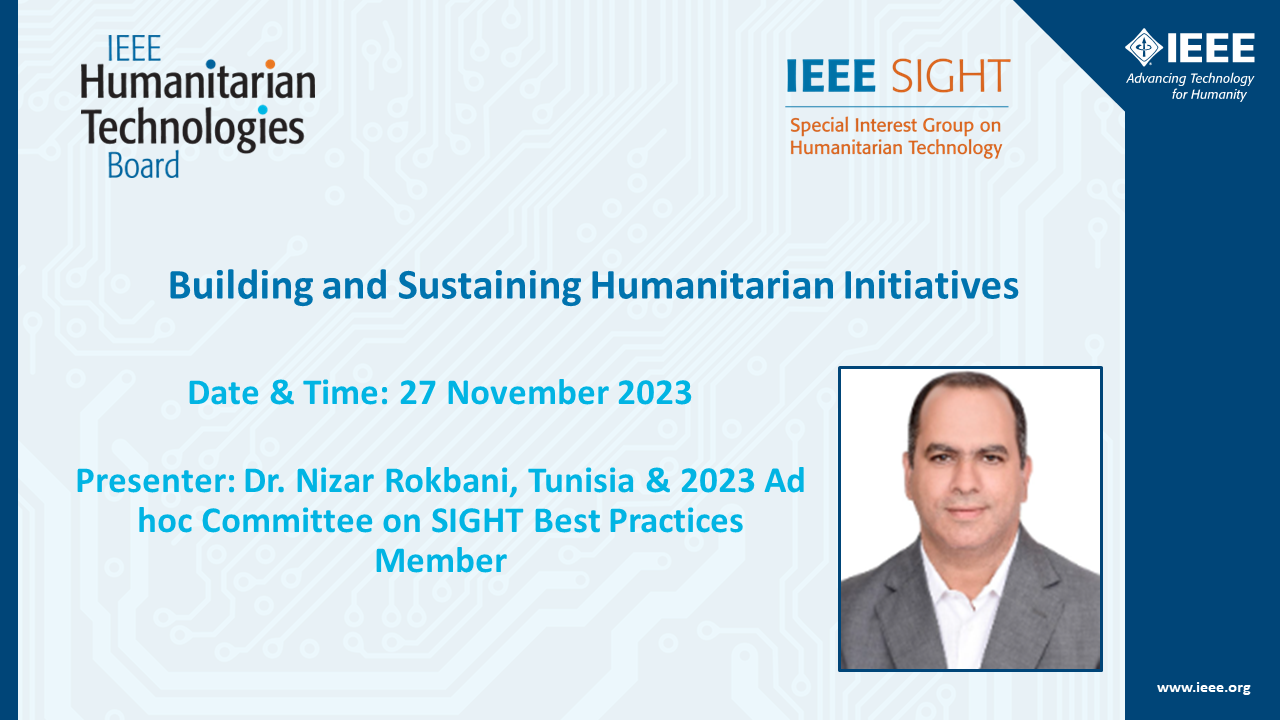
Date & Time: 27 November (time to be confirmed)
Speaker

Dr. Nizar Rokbani is an Assit Prof. University of Sousse, Tunisia and an IEEE Senior member. He has served in several volunteering positions in IEEE RAS and SMC Tunisia Chapters since 2009. He has organized the IEEE Robocomp robotics competition from 2010 to 2015. He is very active in promoting open hard electronics with a specific focus on robotics and related applications. He is very active in promoting STEM and early engineering activities. His research interests include applications of intelligent techniques such as Swarm intelligence, computational intelligence, fuzzy logic, evolutionary algorithms to robotic systems and industrial processes.
Dr. Rokbani received several IEEE awards including the Meritorious Achievement Award in Pre-University Education, IEEE Educational Activities Board 2019, IEEE, USA. “For significantly increasing the impact of the IEEE Teacher In-Service Program (TISP) in Tunisia through the Robotics for Democracy program”; The IEEE R8 Chapter of the year 2019 Award; and the IEEE Robotics and Automation Society, Chapter of the Year Award, 2017.
Past Lectures
Co-designing Ethical Interventions in Resource Constrained Environments
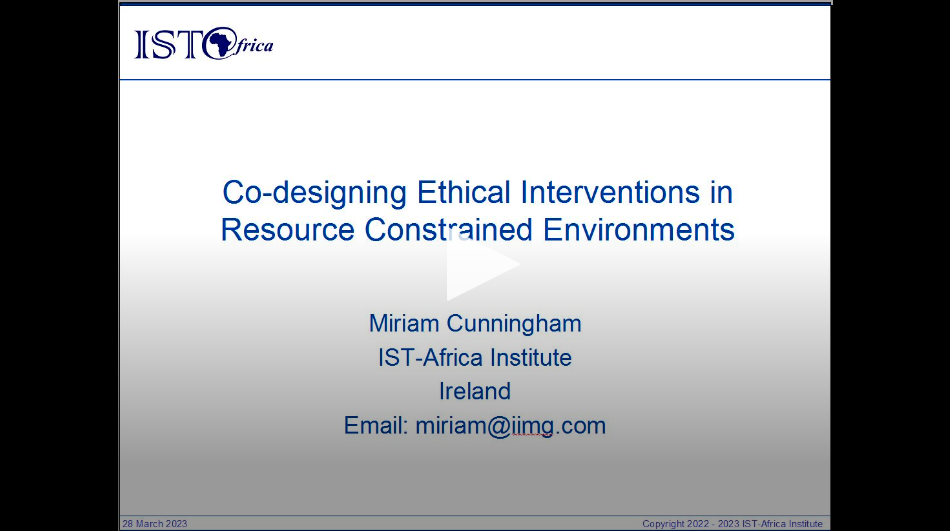
Focus
This SSIT Distinguished Lecture focuses on social implications and ethical issues to be considered when co-designing and implementing interventions in resource-constrained environments. It introduces the concepts of collaborative open innovation, co-design and action research in the context of addressing the UN Sustainable Development Goals (SDGs). It then discusses socio-cultural differences, ethical conundrums and ethical research principles when engaging with local communities. It provides insight into building blocks to be considered when preparing an implementation plan for a community-based ICT4Development intervention.
Speaker
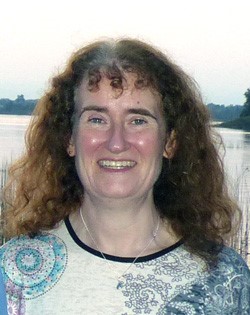 Miriam Cunningham is Head of Research, IST-Africa Institute. Miriam is a Senior technology and innovation expert with over 25 years experience working with education and research, industry and government organisations (including the European Commission and World Bank). Miriam specialises in contributing to policy analysis, research capacity building, adaptation and implementation of appropriate technology in low resource environments.
Miriam Cunningham is Head of Research, IST-Africa Institute. Miriam is a Senior technology and innovation expert with over 25 years experience working with education and research, industry and government organisations (including the European Commission and World Bank). Miriam specialises in contributing to policy analysis, research capacity building, adaptation and implementation of appropriate technology in low resource environments.
Miriam has extensive practical experience undertaking needs assessment, evaluating, monitoring and assessing of Research and Innovation (R&I) projects in Europe and Africa as well as field experience creating, implementing and managing large scale cross-border digital technology innovation oriented projects in Europe and Africa.
Miriam is an active IEEE volunteer with several leadership roles including IEEE SSIT Board of Governors, IEEE SSIT UK and Ireland Chapter Chair and 2023 IEEE Humanitarian Technologies Board Member chairing the Ad Hoc Committee on SIGHT Best Practices.
Avoiding a Graveyard of Solar Panels: How to make Solar Electric Systems Sustainable
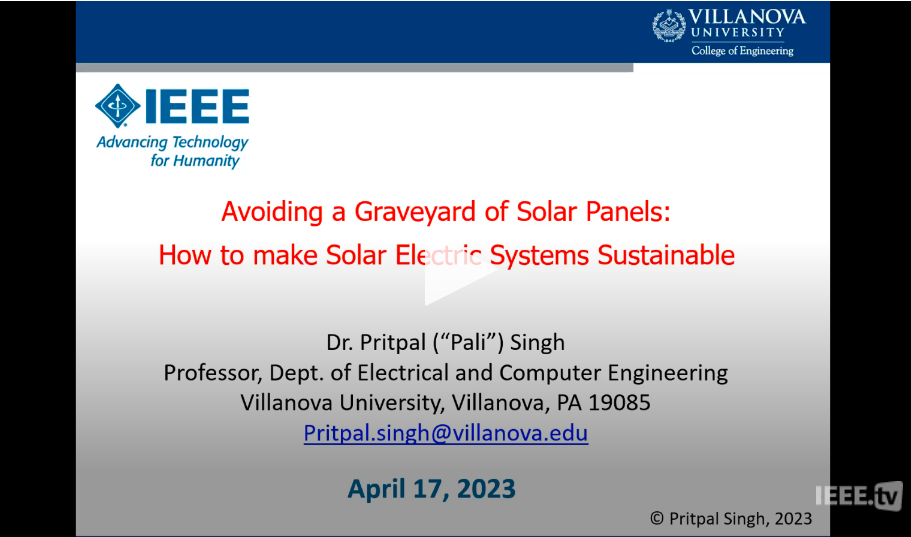
Focus
Solar electric systems offer the opportunity to provide electricity to communities that do not have access to electricity. However, there are many examples of well-intentioned systems being installed and then not being sustained. This leads to many solar panels not contributing to electricity production in these remote communities. In this talk, we will present strategies based on our experiences in the field to make solar electric systems long term sustainable so that communities can continue to receive the benefits of electricity for the long term.
Speaker
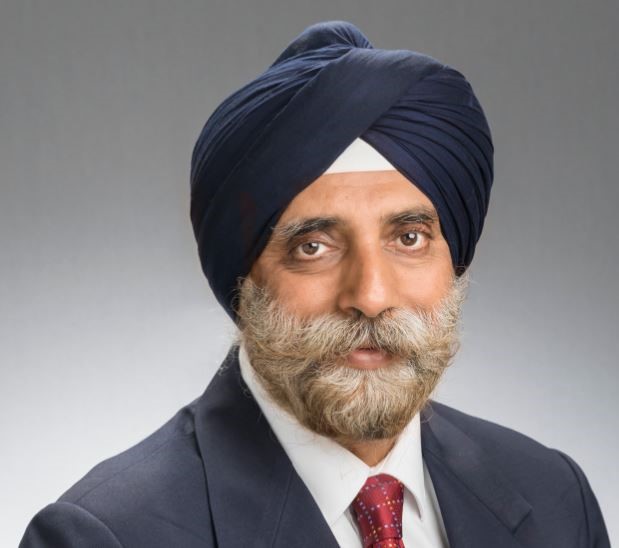 Dr. Pritpal Singh is a Professor of Electrical Engineering at Villanova University. He has been teaching and performing research in solar energy for over 40 years. He also works with students on the design and application of technologies for sustainable development. He ran his own solar business in India for five years and has consulted for the US Department of Energy and three private companies on solar electric systems. He has worked with UNICEF in Nicaragua, Burundi and Zimbabwe and has recently worked on renewable energy and connectivity projects in Ecuador. He served as the IEEE SIGHT Education Subcommittee Chair from 2017 – 2019 and is presently the Vice President of the IEE Smart Village Education Committee. He served as the Technical Chair for the 2020 IEEE Global Humanitarian Technology Conference (GHTC) and will serve as Co-Chair and host of the 2023 IEEE GHTC Conference. He was recently awarded the IFEES Duncan Fraser Global Award for Excellence in Engineering Education.
Dr. Pritpal Singh is a Professor of Electrical Engineering at Villanova University. He has been teaching and performing research in solar energy for over 40 years. He also works with students on the design and application of technologies for sustainable development. He ran his own solar business in India for five years and has consulted for the US Department of Energy and three private companies on solar electric systems. He has worked with UNICEF in Nicaragua, Burundi and Zimbabwe and has recently worked on renewable energy and connectivity projects in Ecuador. He served as the IEEE SIGHT Education Subcommittee Chair from 2017 – 2019 and is presently the Vice President of the IEE Smart Village Education Committee. He served as the Technical Chair for the 2020 IEEE Global Humanitarian Technology Conference (GHTC) and will serve as Co-Chair and host of the 2023 IEEE GHTC Conference. He was recently awarded the IFEES Duncan Fraser Global Award for Excellence in Engineering Education.
Good Practices from Robotics for Equality and Democracy Project Tunisia
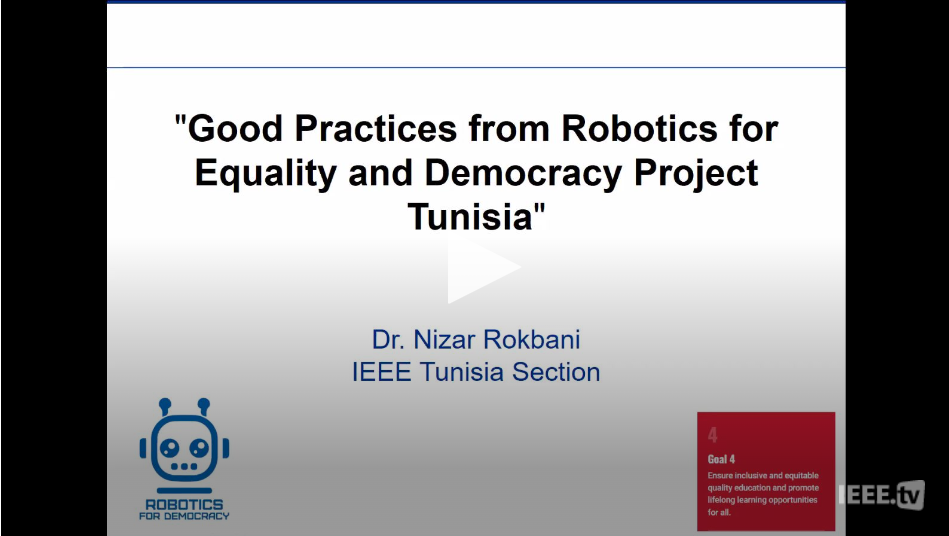
Focus
Robotics for Equality and Democracy is a STEM and educational robotics program deployed in Tunisia public schools as a partnership between a local IEEE SIGHT Tunisia Chapter and the academic inspection for primary education of Dar Chaabane II, Nabeul, Tunisia republic. This lecture will describe the program implementation’s main steps covering alignment with local educational system policies and regulations, the educator’s training, the organization of the learner’s activities and their assessments based on a project based methodology. The IEEE STEM portal and the Try-Engineering lesson plans were the main resources used to build the teaching/training materials. The program was initially developed as extracurricular clubs, before being adopted for curricula activities for technology education.
Speaker

Dr. Nizar Rokbani is an Assit Prof. University of Sousse, Tunisia and an IEEE Senior member. He has served in several volunteering positions in IEEE RAS and SMC Tunisia Chapters since 2009. He has organized the IEEE Robocomp robotics competition from 2010 to 2015. He is very active in promoting open hard electronics with a specific focus on robotics and related applications. He is very active in promoting STEM and early engineering activities. His research interests include applications of intelligent techniques such as Swarm intelligence, computational intelligence, fuzzy logic, evolutionary algorithms to robotic systems and industrial processes.
Dr. Rokbani received several IEEE awards including the Meritorious Achievement Award in Pre-University Education, IEEE Educational Activities Board 2019, IEEE, USA. “For significantly increasing the impact of the IEEE Teacher In-Service Program (TISP) in Tunisia through the Robotics for Democracy program”; The IEEE R8 Chapter of the year 2019 Award; and the IEEE Robotics and Automation Society, Chapter of the Year Award, 2017.
Empowering Women for Sustainable Climate Resilience
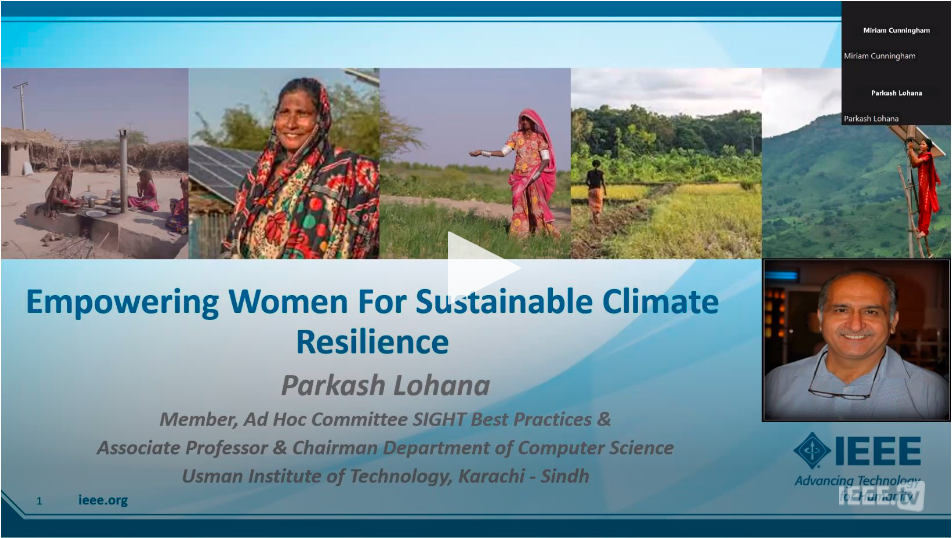
Focus
Climate change and disasters are major challenges in most Asia Pacific regions. It is deeply shaping the lives of communities, women are extremely sensitive to these changes given their lack of access to essential resources such as land, finance, or information, and also affects food security, nutrition, clean water, health, and livelihood.
In particular, remotely habitant women, children, the elderly, people with disabilities, ethnic minorities, and other disadvantaged groups bear the brunt of climate change due to the social inequalities that limit them. Climate change, in turn, widens the social and economic space, trapping communities in a vicious circle.
This webinar will focus on how women can be empowered for tackling climate change, especially by using their knowledge, skills, and abilities to adapt and mitigate climate change.
Speaker
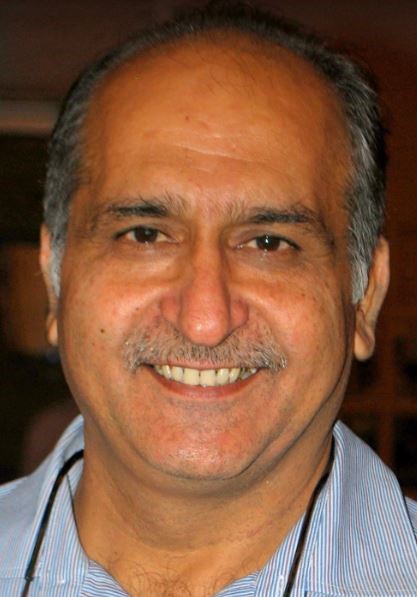 Parkash Lohana is an Associate Professor at the Usman Institute of Technology in Karachi, Sindh- Pakistan. He has more than 30 years of extensive experience as an engineer, as a faculty, as head of a department, and as head of an institution.
Parkash Lohana is an Associate Professor at the Usman Institute of Technology in Karachi, Sindh- Pakistan. He has more than 30 years of extensive experience as an engineer, as a faculty, as head of a department, and as head of an institution.
Mr. Lohana’s professional interests are Information Systems, Information System Audit, Software Engineering, Human-Computer Interaction, Electrical Power Engineering, Engineering & Technology Management, and Engineering IT Education. He has presented his research papers at local as well as international conferences held in Pakistan under Higher Education Commission and Pakistan Engineering Council (PEC). He has published two of his articles in the IEEE Engineering and Technology Management Review in June and September 2015 issues respectively. Mr. Lohana was inducted as a professional member of IEEE HKN in 2021, an honor society of IEEE.
Mr. Lohana is a very active IEEE volunteer and served in many different leadership roles including the chair of the IEEE Karachi Section for your years, and headed IEEE R10 HTA, MDC, and PAC in 2017-18, 2019-20, and 2021-22 respectively. Currently serving as a chair of SIGHT Karachi, and remains a member of the MGA Disaster Management Committee and HAC Assessment and Monitoring Committee.
The Impact of Energy Efficiency on Low Resource Environments
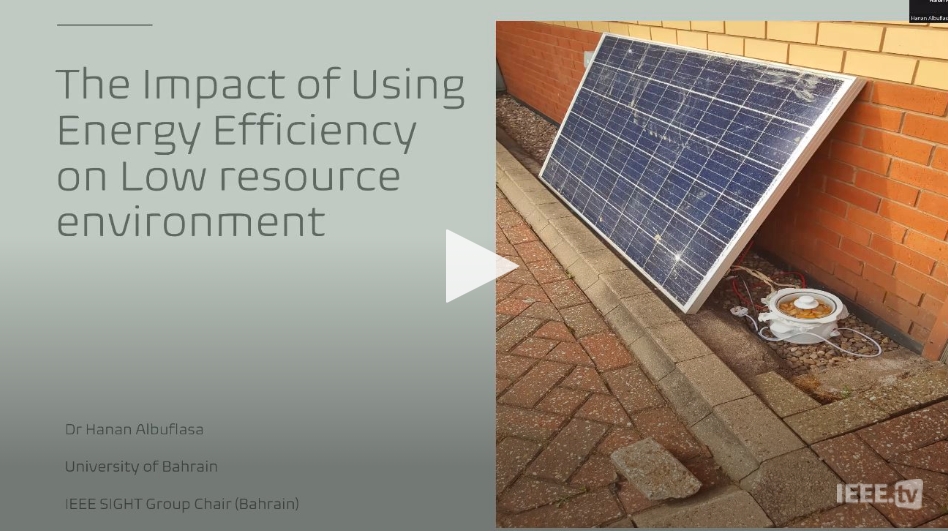
Focus
In recent years, there has been a growing recognition of the important role energy efficiency can play in addressing humanitarian challenges and improving the lives of vulnerable populations. This has led to increased efforts to promote energy efficiency solutions tailored to humanitarian settings’ specific needs and contexts. In this seminar, the speaker explores how energy efficiency can improve humanitarian conditions and discusses some of the challenges and opportunities associated with implementing energy efficiency measures in these contexts.
Speaker
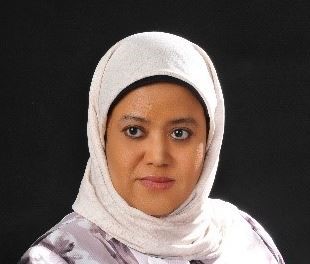 Dr. Hanan M. Albuflasa is the head of the Department of Physics at the University of Bahrain. Dr. Albuflasa has a Ph.D. and an M.Sc in Renewable Energy from the Centre of Renewable Energy System Technologies, CREST, Loughborough University, UK. Dr. Albuflasa is Bahrain’s representative for the GCC Technical Standard Committee on Renewable Energy and Energy Storage Systems, a participating member and country representative of the International Electrotechnical Commission (IEC) for TC 82 and TC 88. She is a senior IEEE member, IEEE SIGHT chair and REGION 8 Power and Energy Society Representative.
Dr. Hanan M. Albuflasa is the head of the Department of Physics at the University of Bahrain. Dr. Albuflasa has a Ph.D. and an M.Sc in Renewable Energy from the Centre of Renewable Energy System Technologies, CREST, Loughborough University, UK. Dr. Albuflasa is Bahrain’s representative for the GCC Technical Standard Committee on Renewable Energy and Energy Storage Systems, a participating member and country representative of the International Electrotechnical Commission (IEC) for TC 82 and TC 88. She is a senior IEEE member, IEEE SIGHT chair and REGION 8 Power and Energy Society Representative.
Bringing Quality Education to Underserved Communities in Latin America and Pakistan
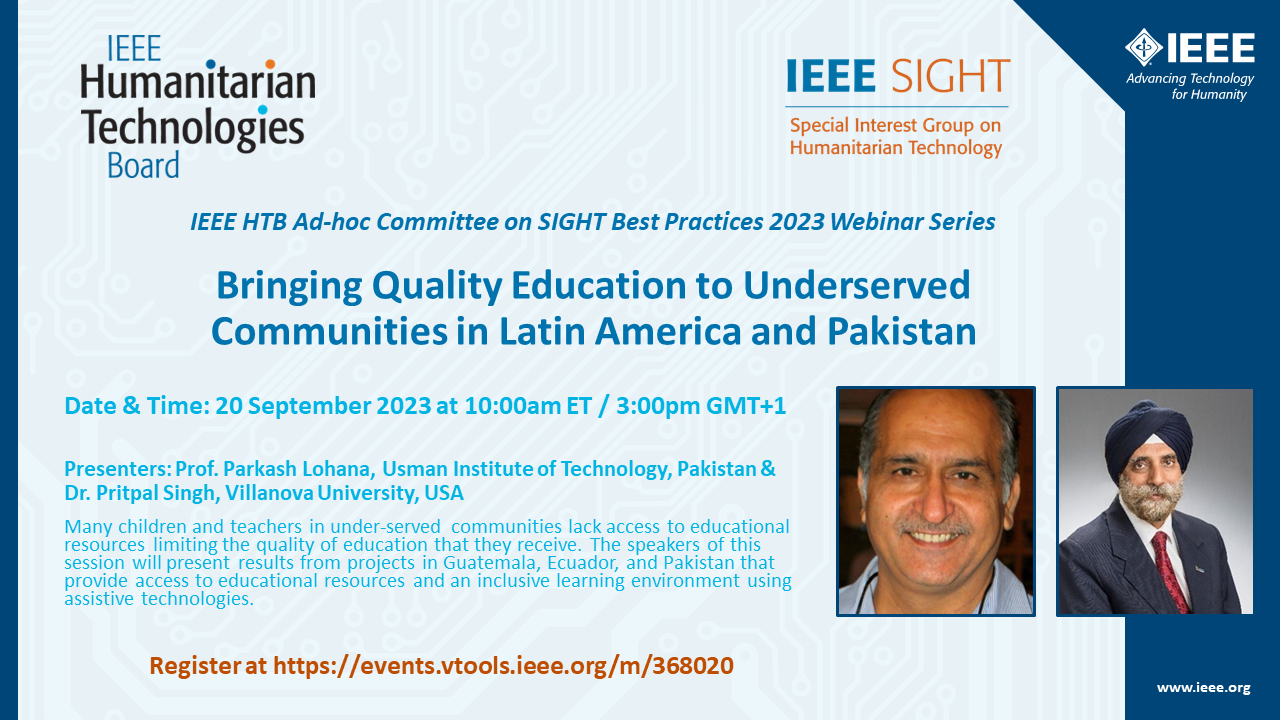
Focus: Many children and teachers in under-served communities lack access to educational resources limiting the quality of education that they receive. The speakers of this session will present results from projects in Guatemala, Ecuador, and Pakistan that provide access to educational resources and an inclusive learning environment using assistive technologies.
Speakers: Professor Pritpal Singh (Villanova University, USA) and Professor Parkash Lohana (Usaman Institute of Technology, Pakistan)
mHealth4Afrika – Lessons Learnt and Good Practices from Co-Designing Technology Solutions for Resource Constrained Environments
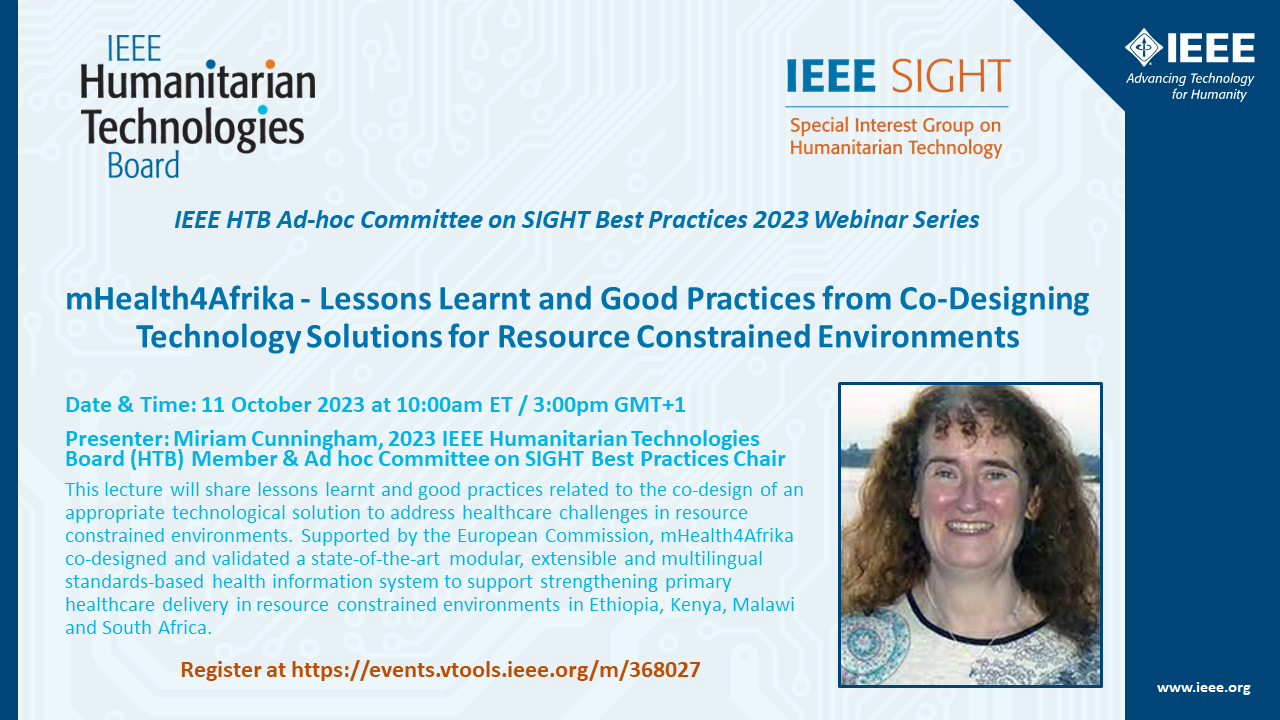
Focus: Many children and teachers in under-served communities lack access to educational resources limiting the quality of education that they receive. The speakers of this session will present results from projects in Guatemala, Ecuador, and Pakistan that provide access to educational resources and an inclusive learning environment using assistive technologies.
Speaker:
 Miriam Cunningham is Head of Research, IST-Africa Institute. Miriam is a Senior technology and innovation expert with over 25 years experience working with education and research, industry and government organisations (including the European Commission and World Bank). Miriam specialises in contributing to policy analysis, research capacity building, adaptation and implementation of appropriate technology in low resource environments.
Miriam Cunningham is Head of Research, IST-Africa Institute. Miriam is a Senior technology and innovation expert with over 25 years experience working with education and research, industry and government organisations (including the European Commission and World Bank). Miriam specialises in contributing to policy analysis, research capacity building, adaptation and implementation of appropriate technology in low resource environments.
Miriam has extensive practical experience undertaking needs assessment, evaluating, monitoring and assessing of Research and Innovation (R&I) projects in Europe and Africa as well as field experience creating, implementing and managing large scale cross-border digital technology innovation oriented projects in Europe and Africa.
Miriam is an active IEEE volunteer with several leadership roles including IEEE SSIT Board of Governors, IEEE SSIT UK and Ireland Chapter Chair and 2023 IEEE Humanitarian Technologies Board Member chairing the Ad Hoc Committee on SIGHT Best Practices.

